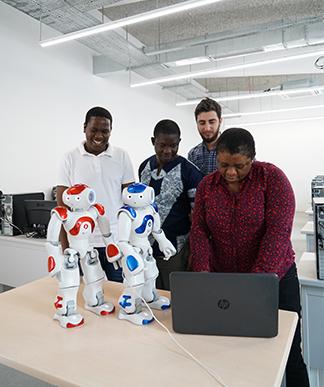


About the Program
In this program, students gain practical skills as well as theoretical knowledge while learning to use new technologies in an efficient way. For this purpose, expert instructors with industrial experience provide the necessary counseling to follow a curriculum with project-based teaching and intensive laboratory work. The program, which is arranged as a two-year education, consists of theoretical and practical courses. Increased practical components of the computer and software courses provide an undergraduate-level education. The aim of the program is to ensure that the students gain the necessary knowledge and skills for their future careers. Under the program; in addition to the basic courses such as database management, Internet programming, and object-oriented programming; free and technical elective courses are also available. Students are prepared for graduation by practicing internship and professional practice as part of the program requirements.
Educational Opportunities
Academic counseling service starts with registration and guides students for course selection and deals with educational problems. The practical training, teaching and research practices are carried out in various laboratories equipped with state–of-the-art technology and other complementary software and hardware. Thus, students are given the opportunity to apply their theoretical knowledge. In addition to the laboratories, course activities, and practical studies; there are many databases available for the students that provide online access opportunities, as well as books in the library on relevant topics to support their studies and research. In addition to these, the course internship (summer training in which students work for 30 days in a company) and seminars and discussions with sector experts, provide students with various learning opportunities and help them to apply their knowledge into practice.

Career Areas
Bearing in mind the demands of today's globalized and digitized world, services sector and the need for advanced skills, the main aim of our department is to train technicians who can work in hardware and software projects in the field of computer and information technology, and are capable of performing research and development while successfully fulfilling their duties and responsibilities. Our graduates have career opportunities in almost every sector; not only in the computer and information technology sector. Some of these opportunities are; developing computer applications, designing and programming web sites, updating databases and software computer installation and maintenance, computer network installation and maintenance, developing applications for mobile devices, developing object-oriented analysis and design, and project development.
Contact
Vocational School
Science and Technology Center, ST256
Tel: +90 392 671 1111 Extension:2751
School E-mail: secretary-voc@ciu.edu.tr
Director E-mail:mnat@ciu.edu.tr
Compulsory Courses
First Semester
INTRODUCTION TO COMPUTING
Course code
COMP101Credit
3Theoretical
2Practical
2Ects
6INTERNET PROGRAMMING
Course code
COMP131Credit
3Theoretical
3Practical
0Ects
7INFORMATION SECURITY AND ASSURANCE
Course code
COMP172Credit
3Theoretical
3Practical
0Ects
7READING AND WRITING SKILLS-I
Course code
ENGL141Credit
3Theoretical
2Practical
2Ects
4BASIC MATHEMATICS
Course code
MATH107Credit
2Theoretical
2Practical
0Ects
4TURKISH LANGUAGE
Course code
TREG100Credit
0Theoretical
2Practical
0Ects
2TURKISH
Course code
TURK100Credit
0Theoretical
2Practical
0Ects
2Second Semester
FOUNDATIONS OF INFORMATION TECHNOLOGY
Course code
COMP102Credit
3Theoretical
3Practical
0Ects
7INTRODUCTION TO PROGRAMMING
Course code
COMP112Credit
4Theoretical
3Practical
2Ects
7READING AND WRITING SKILLS-II
Course code
ENGL142Credit
3Theoretical
2Practical
2Ects
4FREE ELECTIVE
Course code
FREEXX1Credit
3Theoretical
3Practical
0Ects
6HISTORY OF CIVILIZATION
Course code
HIST100Credit
0Theoretical
2Practical
0Ects
2MODERN TURKISH HISTORY
Course code
TARH100Credit
0Theoretical
2Practical
0Ects
2UNIVERSITY ELECTIVE
Course code
UNIEXX1Credit
3Theoretical
3Practical
0Ects
4Third Semester
SUMMER TRAINING
Course code
COMP100Credit
0Theoretical
0Practical
0Ects
4DATABASE MANAGEMENT SYSTEMS AND PROGRAMMING
Course code
COMP213Credit
4Theoretical
3Practical
2Ects
7ALGORITHMS AND PROGRAMMING
Course code
COMP223Credit
4Theoretical
3Practical
2Ects
7INFORMATION SYSTEMS ANALYSIS AND DESIGN
Course code
COMP272Credit
3Theoretical
3Practical
0Ects
6AREA ELECTIVE
Course code
COMPXX1Credit
3Theoretical
3Practical
0Ects
6Fourth Semester
CAPSTONE PROJECT
Course code
COMP200Credit
4Theoretical
2Practical
4Ects
8PYTHON PROGRAMMING
Course code
COMP224Credit
3Theoretical
3Practical
0Ects
6AREA ELECTIVE
Course code
COMPXX2Credit
3Theoretical
3Practical
0Ects
6AREA ELECTIVE
Course code
COMPXX3Credit
3Theoretical
3Practical
0Ects
6UNIVERSITY ELECTIVE
Course code
UNIEXX2Credit
3Theoretical
3Practical
0Ects
4Elective Courses
MANAGEMENT INFORMATION SYSTEMS
Course code
ISE363Credit
3Theoretical
3Practical
0Ects
BUSINESS INTELLIGENCE
Course code
MISY472Credit
3Theoretical
3Practical
0Ects
6ALGORITHMS AND PROGRAMMING
Course code
VCP271Credit
3Theoretical
3Practical
0Ects
0ESSENTIALS OF INFORMATION TECHNOLOGY
Course code
ISE361Credit
3Theoretical
3Practical
0Ects
INFORMATION SYSTEMS ANALYSIS AND DESIGN
Course code
MISY372Credit
3Theoretical
3Practical
0Ects
TR Applicants
TR Students who are successful in the exams conducted by the Higher Education Council Student Selection and Placement Center (ÖSYM) and are entitled to enroll in our university in line with their preferences can complete the registration process with the necessary documents for registration from our Registration and Liaison Offices throughout Turkey or from the Marketing Directorate on campus.
Click for detailed admission requirements information.
TRNC Applicants
TRNC citizens and TR citizen candidate students who have completed their entire high school education in TRNC. They are placed in undergraduate programs in line with their success in the CIU Student Placement and Scholarship Ranking Exam and the programs they prefer.
Students who are successful in the exam can register from the TRNC Marketing Office.
You can directly apply online to our undergraduate programs online using the application portal. Please fill in your details correctly and upload all the required documents listed on the last page of the application form.
Required documents;
- Completed application form,
- Higher/Secondary Certificate or equivalents (e.g. O/A’Level, WAEC/NECO),
- Evidence of English Language competence: TOEFL (65 IBT) or IELTS (5.5). Students without these documents will take the CIU English proficiency exam on campus following arrival,
- Scanned copy of international passport/birth certificate,
- Fully completed and signed CIU Rules and Regulations document (which can be downloaded during the online application).
Cyprus International University provides academic scholarships for its students as an incentive for success, with most students benefiting from 50%, 75% or 100% scholarships or discounted tuition fees. Click for more information.
Tuition Fees are determined at the beginning of each academic year. Candidate students who are entitled to enroll in CIU can learn their fees in line with the Tuition Fee Calculation system.